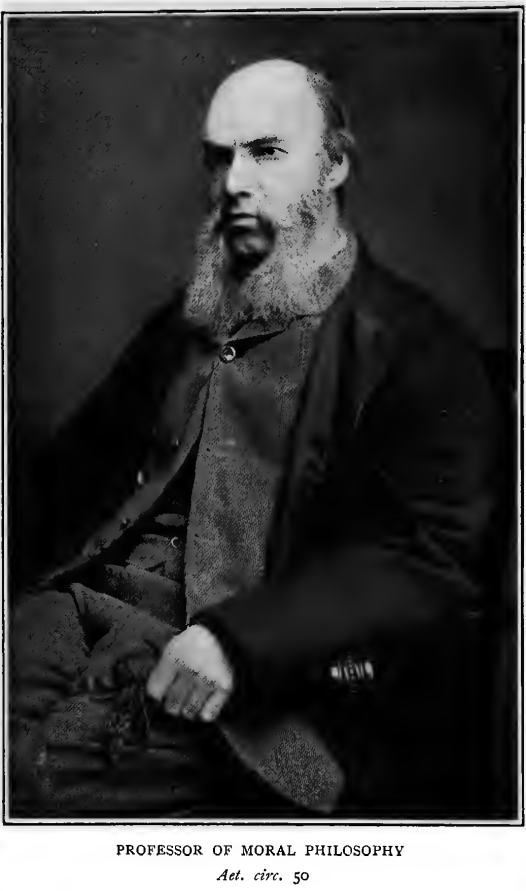|

Caird
himself has written of Carlyle: “The ordinary gossip of
biography is interesting enough, but I must profess for
myself an entire disbelief that any important additional
light is thrown by it upon the character of men who have
otherwise expressed themselves so fully as he.” There
were well-known reasons why the friends of Carlyle
should prefer to judge him by his teaching rather than
by the “gossip" of his biographers. There are none such
in the case of Caird. It is in this conviction that the
editors have ventured to disregard his warning and in
the first part of this book put together the main facts
of a life which, though singularly devoid of “events” in
the ordinary sense, yet in its even flow and its
encounter with men and things so accurately reflects the
spirit of the man. Their hope is that it will assist
those who had the good fortune to know him to recall,
those who had not, to realise how entirely of one piece
were the teaching and spirit of his writings with those
of his life and daily conversation.
He has said in the same essay that “The best way of
dealing with a great author is, in the first instance,
to go to him without much criticism and with a receptive
mind, and to let his way of thinking permeate into our
minds, until it becomes part of their very substance.
For, till we have done so, our criticism will not be
adequate; it will be wanting in sympathy, and it will
rather tend to defend us against his spirit than enable
us to appreciate it. When, however, we have for a long
time submitted to such a powerful influence, when we
have learned to live in the atmosphere of our author’s
ideas, so that we can almost anticipate the turn his
thoughts will take on any occasion it is advisable for
us to change our method, to put him, so to speak, at
arm’s length and to attempt calmly to estimate what we
have got from him, and so to determine his proper place
among the inhabitants of our private Walhalla—among the
company of the wise'to whom we return ever again and
again, as the permanent possessions of our intellectual
life.” It is in some such spirit and after having had to
submit themselves to some such discipline that the
writers have added the short appreciation of Caird’s
Philosophy which follows the Life and Letters, and which
they desire herewith to dedicate to all old
fellow-pupils in Glasgow and Oxford.
It may seem that some apology is needed for the delay in
the publication of this volume. Owing to circumstances
over which the writers had no control, among these the
War and illness, the work of its preparation has once
and again had to be postponed. Perhaps the delay is not
without compensation if it has enabled both writer and
reader to view Caird’s work from a greater distance and
in better perspective.
For the earlier part of the “Life” up to Caird’s
election to the Mastership of Balliol and for Chapter I.
of the “Philosophy,” the first of the editors is
responsible; for the last chapter of the “Life,” for the
editing of the Letters, and for the remaining chapters
of the “Philosophy,” the second. For assistance in
obtaining materials for the Oxford period they have to
thank many Oxford friends and contemporaries, including
the present Master, Mr. Urquhart and Mr. Lindsay,
Fellows of Balliol, Professor J. A. Smith, Mr. F. J.
Wylie and Principal Ernest Barker. But thanks are
especially owed to Principal H. J. W. Hetherington of
University College, Exeter, who not only devoted much
time to interviews and the verification of references in
Oxford, but read the whole of the MS. of Chapter III. of
the “ Life,” Chapters II.-VIII. of the “ Philosophy,”
and assisted the writers with many valuable criticisms
and suggestions—acting, in fact, as a third editor of
the book. They have further to thank Professor J. S.
Mackenzie for reading the whole book in proof and for
his generous encouragement; and Mr. John W. Harvey for
preparing the Index and improving the accuracy of the
text.
Michaelmas, 1921.
I. Life
Chapter I. School and College
Chapter II. Fellow of Merton
Chapter III; Professor of Moral Philosophy in Glasgow
Chapter IV. University and Social Reform
Chapter V. Master of Balliol
II. Letters
III. Philosophy
Chapter I. The Spirit of Caird’s Philosophy
Chapter II. The Problem of Modern Philosophy
Chapter III. Metaphysical Foundations
Chapter IV. Science and Philosophy
Chapter V. Ethics
Chapter VI. Social Philosophy
Chapter VII. Philosophy of Religion
Chapter VIII. Idealism and Recent Thought
Appendix
Download this book here |

